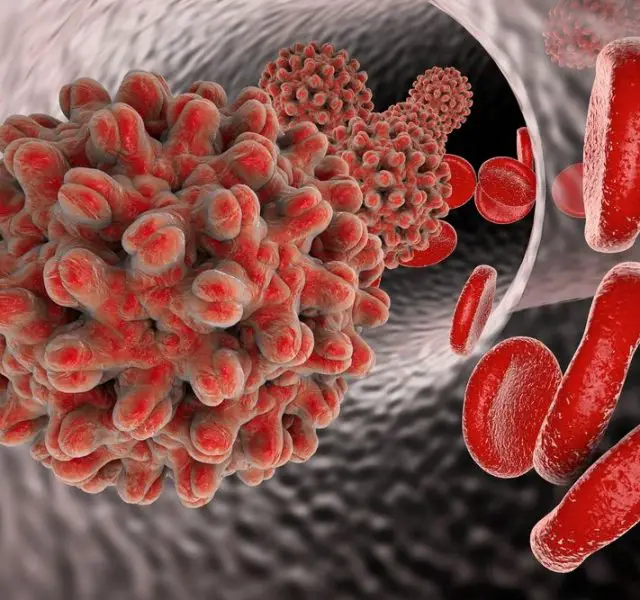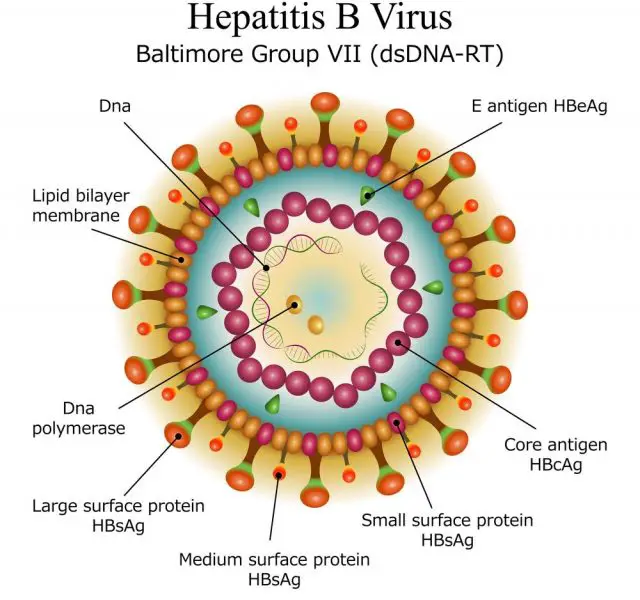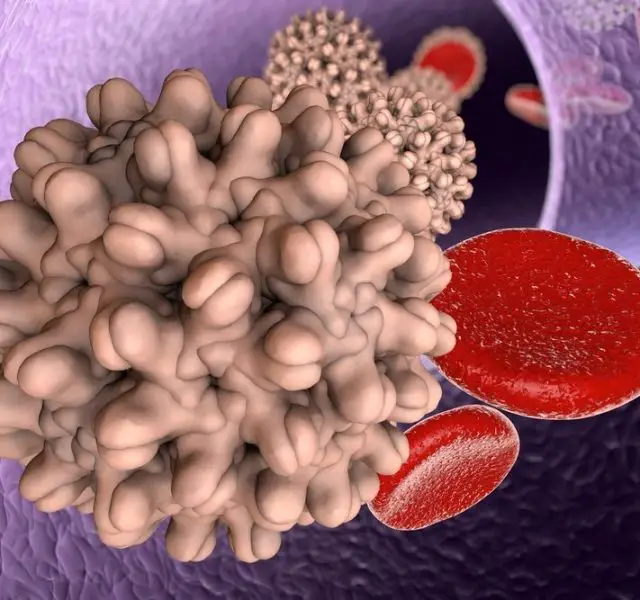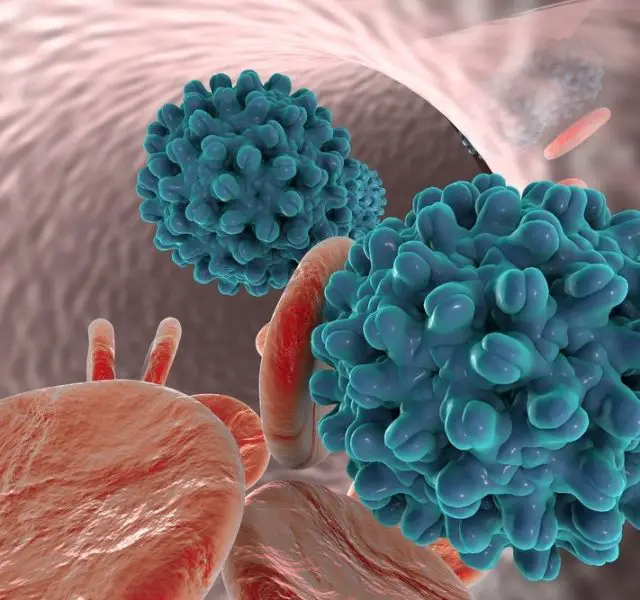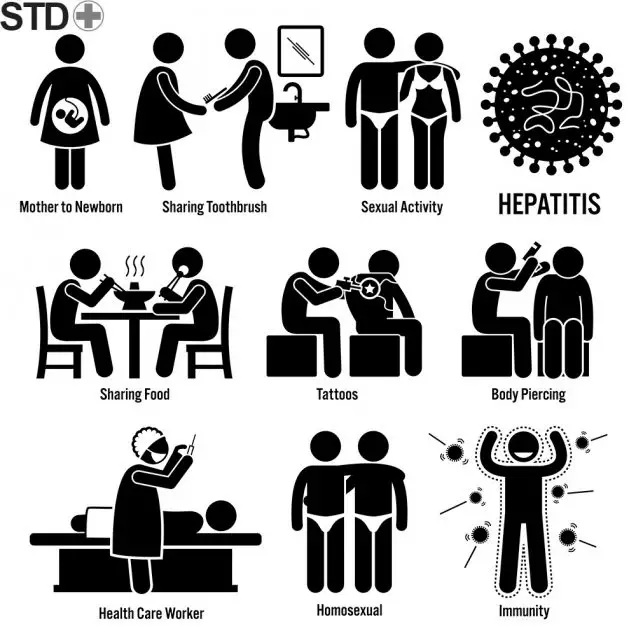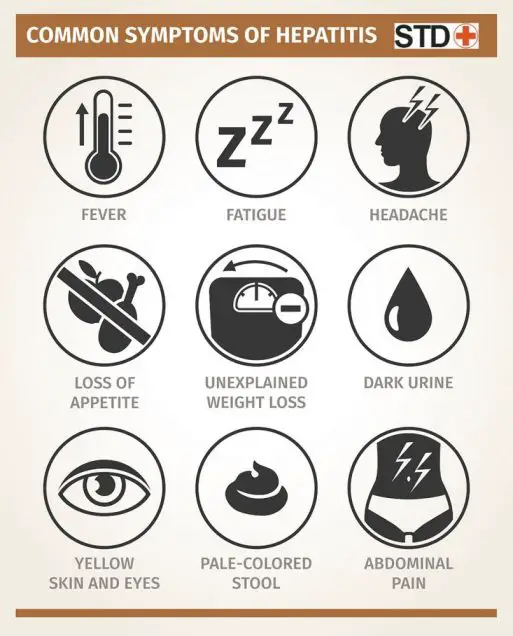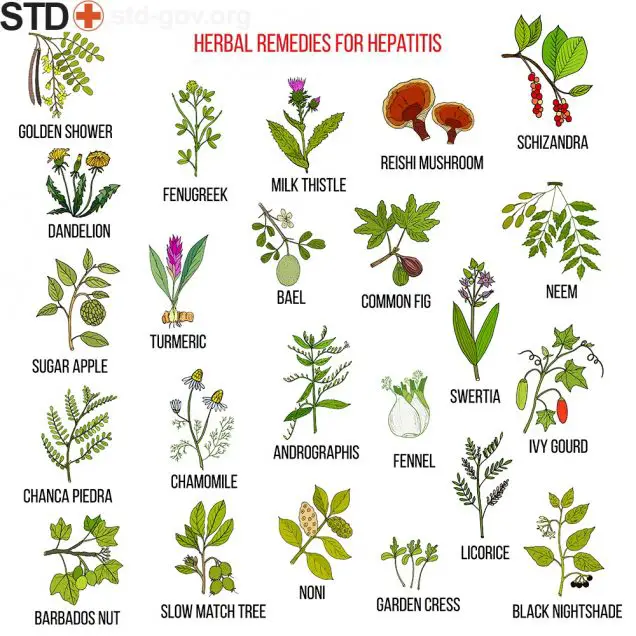Hepatitis B
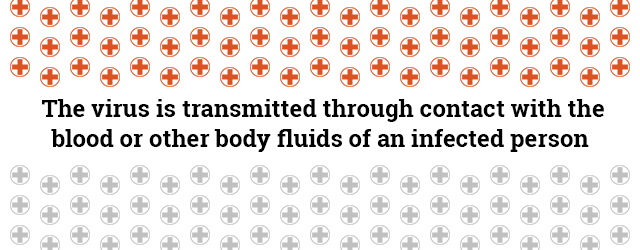
Contents
What is Hepatitis B
Hepatitis B is a viral infection attacking the liver and representing real life danger. The term ‘hepatitis‘ means inflammation of the liver. For some people, hepatitis B is an acute disease but for others it can become a chronic infection.
Nowadays hepatitis B is the most common infection affecting liver in the world. It puts people at risk of death from liver cancer or cirrhosis. Hepatitis B prevalence is the highest in such regions as East Asia and sub-Saharan Africa, where 5–10% of the adults are chronically infected. In North America and Western Europe less than 1% of the population has chronic infection.
Key Facts about Hepatitis B
- Hepatitis B is a liver infection capable of causing both short-term and long-term disease.
- The virus is contracted through blood or body fluids of someone who is infected.
- The virus is up to 100 times more infectious than HIV.
- Two thirds of people who have caught Hepatitis B virus remain unaware of their infection.
- Every year more than 780,000 fatalities are registered due to complications caused by hepatitis B such as cirrhosis and liver cancer.
- Hepatitis B is a major occupational hazard for health care professionals.
- It is possible to prevent the disease by taking a safe and effective vaccine.
Causes and Transmission
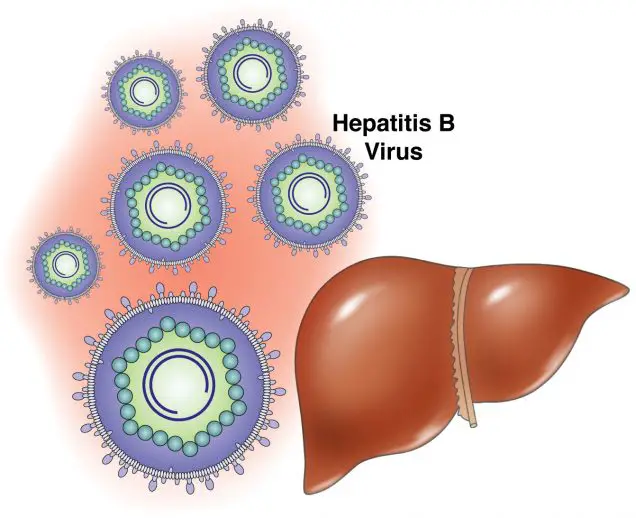
Hepatitis B infection is caused by the Hepatitis B virus (HBV). Hepatitis B virus is passed by contact with blood or body fluids (i.e. seminal, menstrual, vaginal fluids and saliva) of an infected person.
How is Hepatitis B Transmitted?
- Sexual contact. One can catch hepatitis B during unprotected sexual intercourse with an infected person whose saliva, blood, vaginal or seminal secretions enter the body of the partner. Unvaccinated men who have sex with other men as well as heterosexual persons with sex workers or multiple sex partners are under particular risk of obtaining the disease.
- Sharing of needles. Hepatitis B virus is easily transmitted through syringes and needles contaminated with infected fluids. Infection can occur during dental and surgical procedures, tattooing, or through the shared use of razors and other contaminated objects.
- Accidental needle sticks. The infection is a major concern for health workers and other people who have contact with blood.
- Mother to child transmission. Pregnant women with HBV can pass it to their babies during labor. However, it’s important to remember that a newborn child can be vaccinated in order not to get infected in almost all possible cases.
Hepatitis B virus poses a serious threat to those who:
- Have unprotected sex with a partner who has the virus;
- Come in contact with human blood at work;
- Have been on a long lasting kidney dialysis;
- Receive blood transfusions;
- Share needles while taking drugs;
- Get acupuncture or a tattoo with unclean needles;
- Share different personal items (razors, toothbrushes, or nail clippers) with a Hepatitis B infected person.
Symptoms of Hepatitis B
The majority of people experience no significant symptoms during the acute phase of infection. However, some people develop a rapid onset of the disease with symptoms that last a few weeks, including extreme fatigue, yellowing of eyes and skin, dark urine, abdominal pain, nausea and vomiting.
A small amount of people with acute hepatitis experience liver failure which can result in death. Sometimes the Hepatitis B virus can end up in a chronic infection that can develop such consequences as liver cancer or cirrhosis. However, more than 90% of adults recover naturally within the first year without any special treatment. But it’s important to remember that an infected person can transmit HBV to other people even if he or she has no symptoms.
Hepatitis B Testing and Diagnosis

It’s essential to receive a laboratory confirmation of the diagnosis. A number of effective tests are available to diagnose hepatitis B and monitor the condition of infected people. The tests can be used to distinguish chronic and acute infections.

Detection of Anti-HBs (Hepatitis B antibody) by using test cassette, the result showed positive (double red line)
They involve blood or serum tests that detect either antibodies or vial antigens. Laboratory diagnosis of the infection screens the detection of the surface antigen HBsAg. Acute hepatitis B infection is characterized by the presence of this surface antigen and immunoglobulin M antibody to the core antigen. Chronic infection is diagnosed if HBsAg persists for 6 months. Persistence of the surface antigen HBsAg is the major marker of risk for liver cancer and a chronic disease later in life. Follow-up tests are necessary to detect if the disease has gone. Interpretation of the tests for detection of HBV is complex. The results need to be carefully discussed with health care professionals.
Hepatitis B Treatment – Is there a Cure?
Normally acute Hepatitis B does not require special treatment and the majority of adults clear the virus spontaneously. Early treatment may be required only in less than 1% of infected people who are immunocompromised or whose infection takes an aggressive course.
It’s very important to maintain comfort, avoid alcohol, keep to a balanced diet, and replace body fluids lost from diarrhea and vomiting. On the other hand, chronic hepatitis B can be treated with medicines, including antiviral agents. Treatment can help to reduce the risk of cirrhosis and liver cancer.
Chronic Hepatitis B is usually a mild disease among children. Most of them can live full and healthy lives without visible symptoms. However, in some children the virus can cause significant liver damage. They will require medical treatment and intervention. All children suffering from chronic hepatitis B infection should be seen by a liver specialist on a regular basis. During the visits it’s necessary to take blood tests, physical exams and sometimes ultrasounds of the liver.
Medications and Surgery
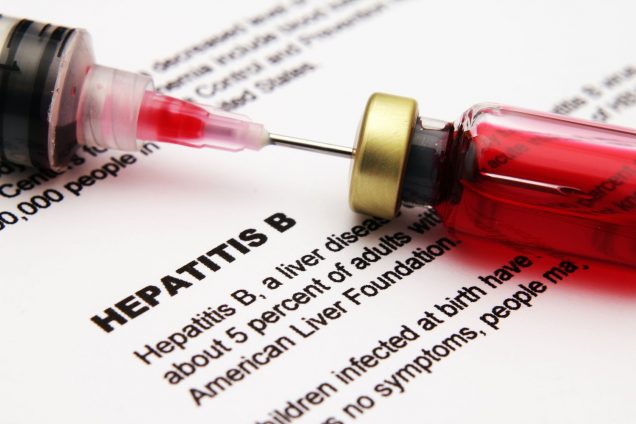
There are two different types of Hepatitis B treatment: antiviral drugs and interferon. As for the former, World Health Organization recommends to use entecavir or tenofovir. They are the most potent medicines to suppress HBV, rarely result in drug resistance and have few adverse effects so only limited monitoring is required. However, the treatment cannot cure Hepatitis B but only makes it hard for the virus to replicate. Therefore, most people must continue treatment for life.
Interferon is injected once a week and boosts the immune system of an infected person to fight Hepatitis B. This treatment is the most effective when the number of viral particles (viral load) is not very high. Unlike antiviral medicines, interferon may show improvements that persist even after the treatment completion. However, the use of interferon is less feasible in low-income areas due to high cost and serious side effects which require careful monitoring. Liver transplantation can be used in people who develop cirrhosis or liver failure, with varying success. Unfortunately, both antivirals and interferon cannot cure Hepatitis B.
Not all the people with chronic Hepatitis B require medication. Each option has its pros and cons but whether you choose to start Hepatitis B treatment or not, it is essential to be examined by a Hepatitis B specialist regularly.
Alternative Medicine
Taking an alternative natural approach to Hepatitis B infection means focusing on maintaining the immune system healthy and supporting the liver. Historically, Chinese herbs have been used to treat chronic Hepatitis B and other liver diseases. Schisandra improves liver function and condition by stimulating liver enzymes and boosting liver cell growth. Milk thistle may be beneficial in fighting the inflammation that may cause complications such as liver cancer or cirrhosis. Vitamin B12, vitamin C, vitamin D, lipid monolaurin and standard multivitamins are important supplements as well. Moreover, laboratory and clinical research has proven that an Ayurvedic formula can halt Hepatitis B virus. It’s made up of two herbs: Cyperus rotundus and Cyperus scariosus. There are many promising alternative ways of Hepatitis B treatment, however it’s vitally important to discuss it with your doctor before taking herbal remedies or over the counter medication.
Home treatment can also bring relief and prevent the spread of HBV. Reduce your daily activity to save body energy. Slow down if you feel tired. A well-balanced healthy diet that is low-fat and contains plenty of vegetables is highly recommended for people with chronic Hepatitis B. Avoid eating raw fish because it can have bacteria which can damage your liver. Drink plenty of water to keep your body well-hydrated. Broth and fruit juices are also a good choice when you have Hepatitis B. Avoid alcohol and smoking because they are harmful to your liver.
Hepatitis B Prevention and Vaccination

Hepatitis B infection is vaccine-preventable. An effective and safe vaccine is used to protect children and adults from the disease. In addition, the implementation of safe injection procedures, blood safety strategies and safer sex practices can protect against HBV transmission. There are simple and effective ways to prevent the spread of Hepatitis B:
- Practice safe sex using protective measures (condoms);
- Avoid direct contact with bodily fluids and blood;
- Wash your hands carefully after any potential exposure;
- Clean up blood spills with a disinfecting solution;
- Avoid sharing sharp personal items such as nail clippers, razors or toothbrushes;
- Cover all wounds and cuts carefully;
- Avoid street drugs (inhaling, injecting, popping pills);
- Make sure sterile needles are used for tattoos, piercing, and acupuncture;
- Moreover, all blood and blood components used for blood transfusions should undergo quality-assured screening to reduce the chance of getting HBV.
However, the mainstay of Hepatitis B prevention is the vaccine. Children and adults exposed to the disease should absolutely receive the Hepatitis B vaccine. The first dose is recommended within 24 hours after birth. It should be followed by either two or three doses given after the first one, preferably within six month. This effective vaccine is recommended for all newborn babies and for children up to 18 years old. Adults, especially those people who fall into a high-risk group because of their occupation or lifestyle, should also consider receiving the Hepatitis B vaccine. The vaccine has a great record of effectiveness and safety. One cannot acquire hepatitis B infection from the vaccine.
If you are not treated
People with an acute form of Hepatitis B do not need special treatment. Moreover, not every person infected with chronic Hepatitis B is required to stay on medication. However, if you are not treated, a chronic infection can develop into such serious diseases as liver cancer or cirrhosis which can result in death.
There is limited access to treatment of Hepatitis B in many resource-constrained areas. Besides, many people are diagnosed only at the stage when they have advanced liver disease. Cancer progresses rapidly and the outcome is usually poor because treatment options are limited in low-income areas so most people with this type of cancer die within a few months of diagnosis. At the same time in high-income settings, chemotherapy and surgery can prolong life for a couple of years.
FAQ:
Is there a cure for Hepatitis B?
For an acute Hepatitis B, the best remedy is a simple bed rest and additional supportive measures. There is still no cure for chronic infection, however there are several approved drugs for adults and children and also many promising drugs in development. These medicines slow down Hepatitis B virus and reduce the risk of liver damage. They may even remove the virus completely but it happens rarely.
When is Hepatitis B vaccination required?
It’s recommended to give Hepatitis B vaccine to all infants at birth as well as children and adolescents up to 18 years. Babies born to mothers with HBV should be given the vaccine together with Hepatitis B immunoglobulin. Adults at high risk of acquiring the infection should also receive the Hepatitis B vaccine. HBV poses a threat to those who live with infected persons, to health care professionals, travelers to countries of high Hepatitis B endemicity, and patients undergoing kidney dialysis.
Who should not be vaccinated with Hepatitis B vaccine?
Hepatitis B vaccine is very safe and effective. Most people have no problems with it. Side effects include swelling, soreness and redness at the injection site. However, anyone with an allergy to yeast or to any other vaccine component should not get the vaccine. Anyone with an adverse reaction to a previous dose should not be given another dose of Hepatitis B vaccine.
Which side effects can Hepatitis B cause?
A small amount of acute Hepatitis B infections can be serious and result in death. The most severe complications occur in people with chronic Hepatitis B infection. The younger the person is, the bigger the likelihood of staying infected and developing life-long problems with liver. 20–30% of chronically infected adults will suffer from cirrhosis or liver cancer. Hepatitis B side effects include:
- Liver cancer. People with a chronic Hepatitis B have an increased risk of developing liver cancer.
- Cirrhosis. The inflammation caused by Hepatitis B can result in extensive liver scarring, which may reduce the liver’s ability to function properly.
- Acute liver failure. It’s characterized by shutting down vital functions of the liver. When that occurs, transplantation is required to sustain life.
- Other complications. Infected people may have inflammation of blood vessels, kidney disease or anemia.

